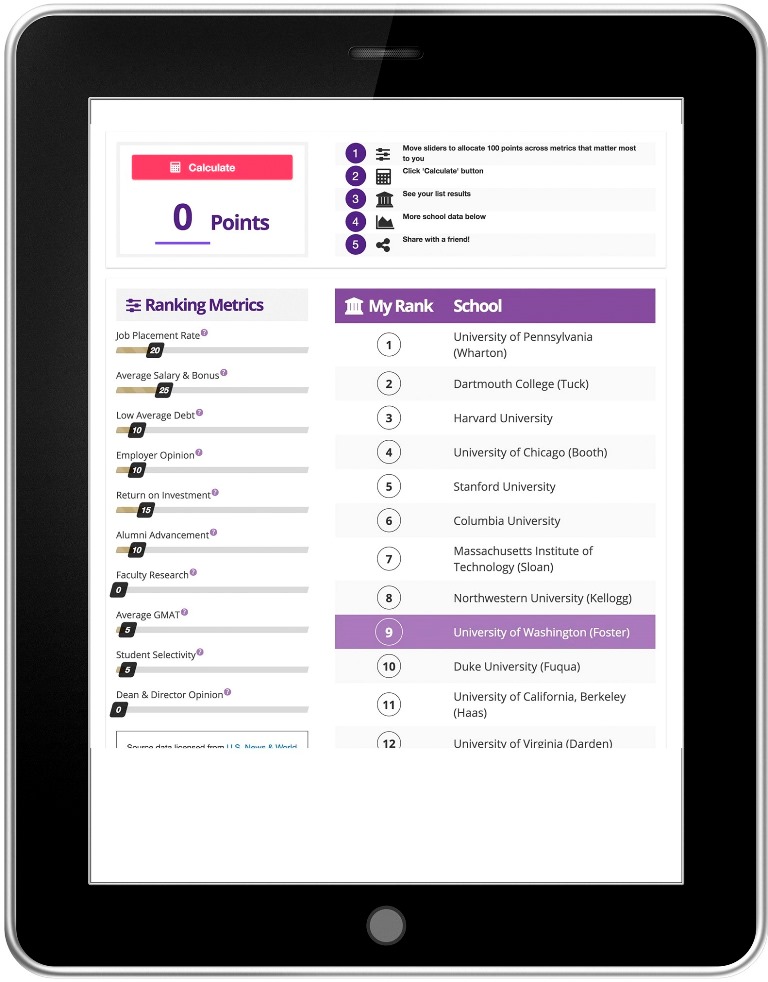Metrics That Matter
When you focus on the factors most meaningful to MBAs, across top rankings, the Foster School soars to #9 in the nation—and #1 among public universities
The proliferation of MBA rankings holds the University of Washington Foster School of Business in high regard. Foster is ranked #19 in the nation (and #5 among public universities) by the Financial Times and Bloomberg Businessweek, #21 (and #7 public) by the Economist, #22 (and #8 public) by Poets & Quants, and #27 (and #9 public) by U.S. News & World Report.
It’s a consistently strong performance across the board, especially considering the pool of business schools numbers nearly 800 accredited by AACSB.
But Poets & Quants, the influential MBA news site, has suggested that Foster would fare even better if the rankings emphasized metrics that really matter to students.
Now this suggestion is more than academic. Aggregating user-weighted search criteria on Foster’s new customizable MBA Rankings Calculator, the Foster School emerges at #9 in the nation and #1 among public universities.
 How do we come to this conclusion? From some pretty big data.
How do we come to this conclusion? From some pretty big data.
Cutting through the noise
Program rankings exist, ostensibly, to help prospective students find the best school for them. But each ranking is composed of a different combination of sometimes obtuse criteria. And some of these criteria have little to do with the interests of MBAs.
To help applicants make a more informed choice about their best educational fit, the Foster School developed the MBA Rankings Calculator last year. This free online tool deconstructs four of the top published MBA rankings and organizes their licensed data into ten distinct metrics (determined, in part, by prospective students): job placement rate, average salary and bonus, average debt, employer opinion, return on investment, alumni advancement, faculty research, average GMAT, student selectivity, and dean and director opinion.
A sliding scale allows each user to assign a weight to each of these metrics. This generates a top 30 listing that is customized based on the features they deem most meaningful.
Since its introduction last year, the MBA Rankings Calculator has been used more than 30,000 times by prospective students from across the United States and 94 other nations.
In addition to providing useful intelligence to those MBA seekers, the volume of calculations has also opened a window into the particular ranking components that MBAs care most about.
Their top four metrics—salary, placement, ROI and employer opinion—are all about outcomes.
And when you apply these average user weights to the calculator, the Foster School rises well above its standing in any of the component rankings.
Positive outcomes
The rankings issued by U.S. News, Businessweek and the like may be rather imprecise instruments with which to measure the quality of an educational experience. But if you drill down a bit, you can see why Foster excels at delivering the outcomes that MBAs desire.
Placement rate – Businessweek, Financial Times and U.S. News concurred in rating Foster #1 of the top 20 U.S. schools for its 98 percent job placement last year.
Average salary – U.S. News noted that Foster MBAs commanded an average starting salary plus bonus of $133,299 last year, one of the nation’s highest. Moreover, FT reported that Foster MBA grads earned an average salary increase of 97 percent within three years. It didn’t hurt that Foster placed more of its grads in tech industry jobs than any other b-school last year.
Employer opinion – Recruiters rated Foster #12 nationally and #2 among publics in employer satisfaction according to Businessweek.
Return on investment – U.S. News declared the Foster MBA the “Best Bang for the Buck” in 2015. Poets & Quants extolled the school’s outstanding value in 2016. And this year, both Businessweek and U.S. News declared Foster’s ROI is without peer, based on a salary+bonus-to-debt ratio that is far superior to any of the nation’s other top 30 schools.
“Foster students pursue an MBA degree for many different reasons,” says Dan Poston, associate dean for masters programs. “But nearly all of them share one common objective: to come out of the MBA program with a more meaningful, more rewarding career. Foster succeeds by never losing sight of that common endgame.”
